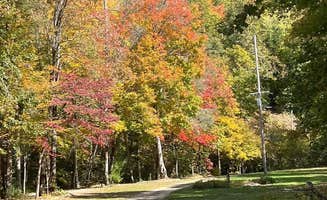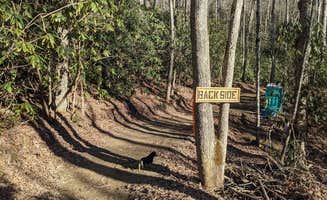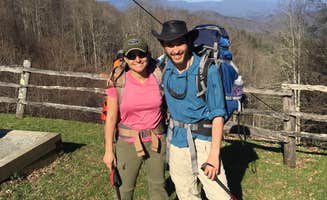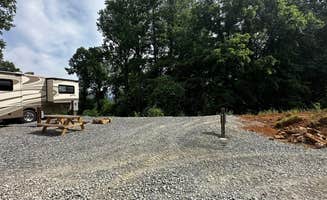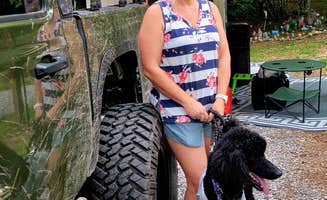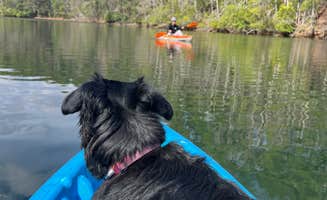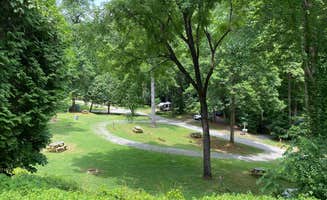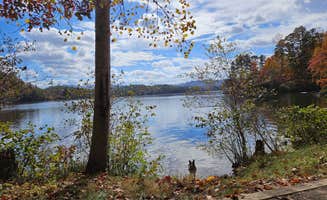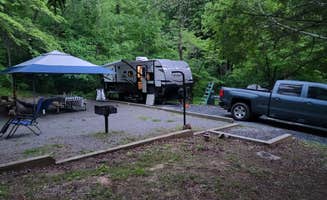Nantahala National Forest provides diverse pet-friendly camping options near Topton, North Carolina, with elevations ranging from 1,200 to over 4,000 feet. The forest spans over 530,000 acres across western North Carolina, creating distinct camping microclimates where temperatures can vary by 10-15 degrees between valley floors and mountain campsites. Winter visitors should note that many campgrounds close seasonally between November and March.
What to do
Hiking with dogs on Bartram Trail: The trail system offers moderate to difficult terrain accessible from multiple pet-friendly campgrounds. At Standing Indian Campground, hikers can access both the Appalachian Trail and Bartram Trail systems. "The entrance to this park is right across the street to an entrance to the Appalachian Trail," notes John K., who recommends exploring the network of trails.
Mountain biking with your pet: Tsali Campground provides direct access to mountain biking trails where leashed dogs are welcome. "The Tsali system starts right from the campground. You can ride to & from your campsite and never have to load up," explains Tony C. The trail system alternates days for bikes and horses, so check the schedule before planning your ride with your pet.
Waterfront activities for dogs: Several campsites offer direct lake or creek access where dogs can cool off. "The headwaters of the Nantahala River flow through the campground providing a gathering place for families to enjoy playing in a cold mountain stream," shares Nancy R. about Standing Indian Campground. This makes it ideal for pets that enjoy splashing in shallow water.
What campers like
Privacy between sites: At dispersed camping areas, campers appreciate the isolation between sites. "Sites are so spread out it feels like you're the only one on the lake!" explains Kaylee D. about Long Hungry Road Dispersed Campsites, where pets have more freedom to relax without close neighbors.
Clean facilities: Many campers with pets highlight the importance of well-maintained bathrooms. "Cleanest bathrooms I have ever seen at a campground," says Jason L. about Turkey Creek Campground. Clean facilities make extended stays with pets more comfortable, especially after muddy trail adventures.
Natural water features: The sound of running water enhances the camping experience for both humans and pets. "The creek is beautiful but can get busy on a sunny day with tubers floating down," notes Marina V. about Deep Creek Campground. These water features provide both ambient noise and cooling opportunities for pets during warm weather.
What you should know
Bear safety requirements: All campgrounds in Nantahala National Forest require proper food storage to prevent wildlife encounters. "Very strict rules regarding food storage and park has managed to control bears and raccoons," reports Kim L. about Elkmont Campground. This applies to pet food as well, which must be secured when not in use.
Limited cell service: Many campgrounds have minimal or no cell coverage, requiring advance planning. "Zero signal at both areas for Verizon and T-Mobile," warns Aly E. about Lake Santeelah Dispersed. Download maps and pet-friendly trail information before arriving, as you won't be able to search for emergency vet services once on site.
Road conditions: Access roads to remote campsites can be challenging, especially with pets and gear. "The road to this campground is very narrow, the hill is very steep, and there is at least one very tight hairpin turn," cautions John K. about Standing Indian Campground. Allow extra travel time and consider vehicle capabilities when choosing a campground.
Tips for camping with families
Group-friendly layouts: Appletree Group Campground offers expansive sites ideal for families with pets. "The campgrounds are very nice and spacious and have huge fields that are great for groups," says Asher K. These open areas provide room for both children and pets to play safely.
Water play opportunities: Families value shallow creek access where both kids and dogs can cool off. "Each site has a large pavilion, massive fire ring, water spigot and toilets," notes Jeffrey S. about Appletree Group Campground, adding that "The Nantahala river runs through the campground for fishing."
Noise considerations: Some campgrounds enforce quiet hours to ensure restful sleep for all campers. "Quiet hours are definitely not proactively enforced," warns D & Jess W. about Tsali Campground. Families with pets that bark at night sounds should consider sites further from main camping areas.
Tips from RVers
Hookup availability: Deep Creek Campground accommodates RVs but with specific site limitations. "Although sites say they are for tents or RVs, some are very odd and only have parking space for an RV on the road, and your table and other areas are above or below," advises Susan G., recommending that RVers check sites before setting up.
Leveling requirements: Many mountain campsites require leveling equipment for RVs. "And bring levelers; you will need them!" Susan G. emphasizes about Deep Creek Campground. The mountainous terrain creates few naturally level parking areas, especially at primitive sites.
Seasonal access limitations: RVers should note that many campgrounds have limited seasons. "Only downside is it closes mid October until April," mentions Robbie B. about Tsali Campground. Off-season camping options for RVs with pets are more limited, with Turkey Creek Campground being one of the few that extends its season into November.


